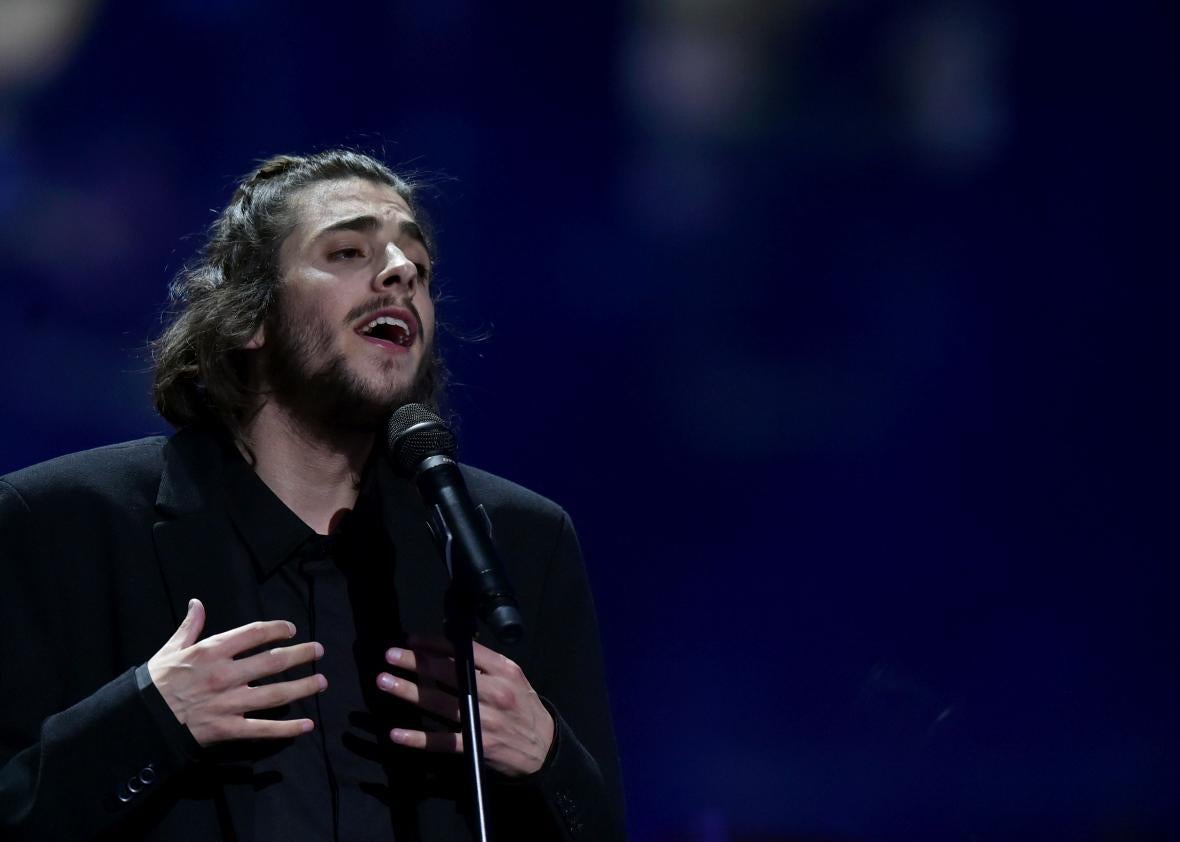Ever wondered what Romanian rap or Estonian disco sounds like? Ever hoped pop music could be freed from the shackles of conventional taste? The Eurovision Song Contest will answer your prayers.
Every year since 1956, Eurovision has pitted countries (mostly European but not strictly) against one another in a fever dream of kooky outfits, kookier songs, cray-cray staging, and protracted voting procedures that superfans swear are the best part of the whole thing. (The ignominious “nul points” has become a cult phenomenon.)
The U.S. has been slow to catch Eurovision fever, but on Saturday, Americans were able for the second year in a row to witness the nearly four-hour–long, commercial-free telecast, thanks to a live broadcast from Kiev, Ukraine, on Logo.* Eurovision 2017 delivered genuinely thrilling musical moments, flying in the face of those who might be tempted to snicker. But snickerers were well served as well, thanks to the American commentators, RuPaul’s Drag Race judges Michelle Visage and Ross Matthews—who rose to the challenge of introducing Bielorusian or Croatian acts to the home crowd.
Sweet, man-bunned Salvador Sobral earned Portugal’s first-ever ESC crown with the minimalist lullaby “Amar Pelos Dois,” defying two commonly held beliefs: that it helps to sing in English and that winners must sell-sell-sell with extroverted showmanship and memorable costumes. The runner-up was Bulgaria’s Kristian Kostov, an angelic 17-year-old, while 3rd-place Moldova honored that country’s tradition of memorable performances with SunStroke Project’s “Hey Mamma,” which boasted a great sax hook and mono-leg choreography. Sobral’s 758-point victory was a comfortable one, well ahead of Bulgaria’s 615 and last year’s winning entry from Ukraine, which only scored 534. (Each country attributes a total of 24 points, half of them picked by a five-person jury and half by televoting.)
Too bad Sobral had to ruin it all with a self-righteous acceptance speech in which this daring purveyor of lite samba informed us that “music is not fireworks, music is feeling, so let’s try to do this and bring music back, which is what matters.” By that standard the winner should have been Blanche, the 17-year-old Belgian responsible for the evening’s most transcendental performance. And besides, what’s wrong with fireworks?
Eurovision 2017 took place in Kiev because Ukraine’s win in 2016 earned it the right to hold this year’s semi-finals and grand final. This was Ukraine’s second win; the last time it hosted, in 2005, its entry, the reggae band GreenJolly, was asked to remove a reference to a defeated presidential candidate from its song. ESC rules prohibit overt politics. But politics was baked into Eurovision from the beginning: The contest was hatched when World War II’s wounds were still fresh, in order to foster European unity and cooperation. As the past year demonstrates, the plan has been going swimmingly.
This year, Ukraine refused to issue a visa to Russian singer Yuliya Samoylova because in 2015 she had performed—illegally, as far as Ukraine was concerned—in Crimea, a Ukrainian region forcefully annexed by Russia in 2014. It was hard not to see Russia’s pick as a provocation, especially since Ukraine won last year thanks to the Crimean Tatar Jamala, whose song, “1944,” was about her people’s deportation by the Soviets during World War II. Russia huffed and puffed,and withdrew from the ESC rather than pick a different singer.
A dispute like this one isn’t uncommon in the supposedly apolitical contest’s history. In 2009, Georgia withdrew rather than change the lyrics to its disco banger “We Don’t Wanna Put In” at the request of pun-savvy host country Russia. In 1978, countries from North Africa and the Middle East (which don’t participate but broadcast the competition) interrupted the telecast or ran commercials during Israel’s song. And so on through the decades.
Politics also plays a major role in the voting process, and many ESC fans are pop-minded Nate Silvers, parsing voting patterns like the entrails of dead birds. There didn’t seem to be any overt ill will against the Brexiting U.K., which finished in 15th position, this year. (It’s not a bad showing by their recent standards.) But the devil is in the details: Ireland gave the U.K. a meager 4 points out of a potential 24, while perennial frenemy France gave 3 and Belgium, home of the EU capital of Brussels, gave 2. Hosting does not give a home advantage, either, as Ukraine ended up in 24th position, with a good chunk of its points coming from Azerbaijan and Italy.
As for Portugal, it was supported by a broad coalition and gleaned points from every single country except Montenegro and Bulgaria, with maximum allotments from an unlikely coalition including the likes of Iceland, Spain (duh!), Switzerland, and Israel. Even France gave it 24 points, proving it did not hold a grudge after last year’s defeat against Portugal in the final of soccer’s Euro Cup.
What this portends for the future of Europe is unclear, except for one thing: When the ESC moves to Lisbon next year, there will definitely be fireworks.
*Correction, May 17, 2017: This post originally misstated the day of the Eurovision Song Contest 2017. It took place on Saturday, May 13, not Sunday, May 14.
